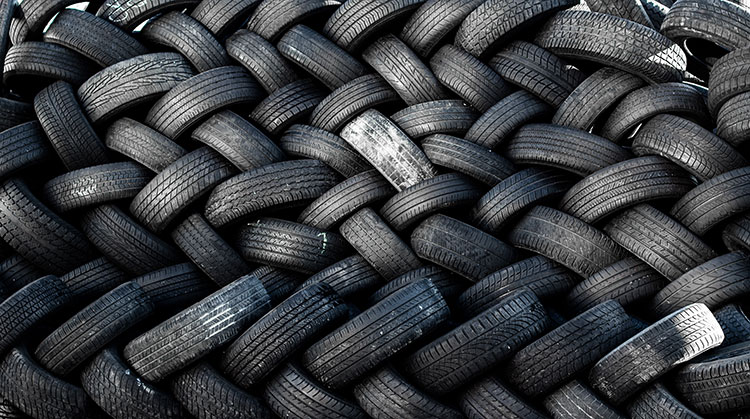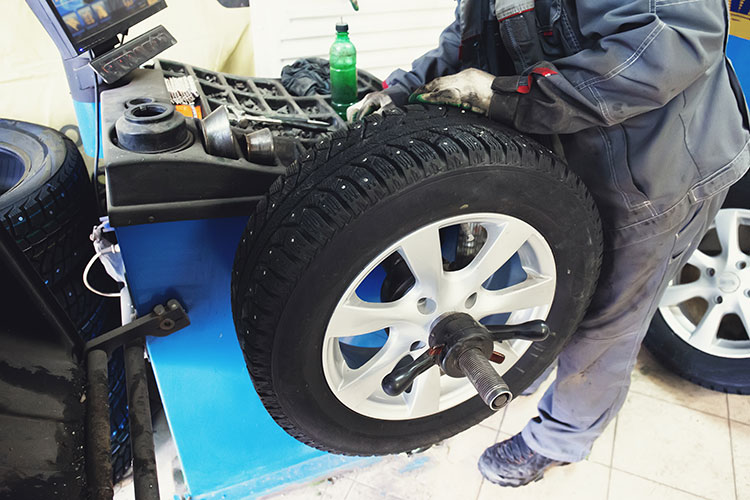The government have committed to publicly consult on introducing two new extended producer responsibility (EPR) regimes by the end of 2022.
The resources and waste strategy outlined five potential waste areas to be explored. Given that the majority of EU states already have EPR for tyres, it was no surprise to see it listed.
Plastic packaging has hit the headlines, but citizens are becoming increasingly aware of the prevalence of the material in other applications. Awareness of microplastics ending up in waterways as a result of clothes washing has increased, hence textiles are also in the spotlight. However, less well understood is the consequences of tyre wear on the environment.
It may even be a surprise to many that tyres do not solely consist of rubber but a blend of materials, including plastic. MPs, however, have picked up on the issue and just a month ago a group called for urgent action to resolve the impact of tyres and brakes. The particles released through road wear have health impacts on drivers, passengers and bystanders, not just through the waterways they are washed into, but within the immediate air quality.
The wider impact of tyres
The issue of tyre consumption is not new. WRAP conducted a study looking at the remanufacture potential as far back as 2006. Many of the truck tyres used in the UK are purchased under a service model, based on mileage. This has put tyre longevity and re-treading in the interests of manufacturers and retailers. However, the change in sales method from product to service only considered life extension, rather than the wider impacts of tyres while in use.
Government intervention is likely as voluntary initiatives haven’t had a significant impact on product design. While many tyre retailers choose to use companies from the responsible recycler scheme to ensure tyres are adequately treated at the end of life, such schemes do little to reduce microplastics from tyre wear.

Advancements in the definition of “producer responsibility” mean that fees from tyre producers may not simply be the method for harvesting funds for waste management. Car owners will already be familiar with the “environmental” or “disposal” charge imposed by retailers. Simply levelling the playing field by making such charges mandatory is unlikely to go far enough to address the environmental concern in the eyes of the UK Government.
There has been mention of the potential for implementing radio-frequency identification (RFID) tags to ensure tyres can be identified when found in the wrong place, but the reality is that this high-tech solution does not solve the whole issue.
Options to tackle the problem
There are a few options available to the government for tackling the problems caused by tyres, including EPR, tax or voluntary commitments. However according to the European Tyre and Rubber Manufacturers’ Association, only Denmark and Croatia have opted for a tax regime in Europe, with the majority of states implementing EPR. Only the UK, Germany, Austria, Switzerland and a handful of Western Balkan states do not have a formal system, preferring a voluntary free-market for producers and retailers to take responsibility.
In 2017, the Republic of Ireland became one of the more recent nations to introduce producer responsibility. The first party to place a tyre on the Irish market (producer) is charged a visible Environmental Management Cost (vEMC) by the compliance scheme operator, REPAK ELT. The producer must then pass on this fee to their customers, with it separately displayed on websites, invoices and receipts. Like many other EU states, the system is centralised and there is no competition between compliance scheme operators.

However, even modern schemes like this do not modulate producer fees based on the design of their tyres. It is possible that a UK regime could look at factors such as longevity, repairability and degradability in setting a fee per tyre. Looking across other product areas, such as electronic equipment, the government are already wrangling with how to use EPR to influence product design to deliver products with better environmental credentials.
While the government will be wary of intervening in manufacturing, they could help to nudge producers towards the creation of better performing products by imposing a higher fee on low-cost, quick wearing tyres, for instance.
Although tyres are an automotive product, there does not appear to be an obvious cross-over with the regulations already in place in the UK for end-of-life vehicles. This regulation is aptly named as it solely looks at end-of-life and not product design.
There are a multitude of solutions for what to do with a used tyre once it is no longer safe for a vehicle, including my favourite, the old fashioned tyre swing. However, it would go against the grain if the government didn’t move new legislation away from waste management into product stewardship.
Wider governmental policy required
Ultimately, when it comes to the problem of tyre wear, it seems that only a reduction in use will improve the situation. While electric cars are viewed as the technological panacea for the automotive industry, they still have conventional tyres that wear in the same way as combustion vehicles.
Reducing the impact of tyres significantly may actually require decreased car ownership across the board and increased non-road travel and logistics. Something an EPR regime is unlikely to be able to tackle, no matter how many environmental factors are considered within it.
The issue of tyre-use reduction is likely to require much wider governmental policy that could impact many other industries than just tyre manufacturers and retailers.
If the Government are to be as bold as their Resources and Waste Strategy proclaims, they will need collaboration across Whitehall departments, well beyond environmental policy, to resolve this issue.
Find out more about the wider impacts of future EPR, including textiles, bulky waste and construction materials.

Robbie Staniforth
Innovation and Policy Director
Robbie is innovation and policy director at Ecosurety. Having spent years building an intimate understanding of the industry’s policies and politics, he uses this knowledge to help shape new legislation and oversees Ecosurety’s growing portfolio of cross-industry innovation projects including Podback and the Flexible Plastic Fund. He has worked closely with Defra during the most recent packaging consultations, outlining the impacts and required transitional arrangements of the UK’s new EPR system and is a member of the government’s Advisory Committee on Packaging (ACP). He is also a spokesperson for the company and regularly uses his influence to communicate the importance of environmental responsibility to external stakeholders.

Latest News

Q2 2024 recycling data shows strong performance in H1
By Sam Marshall 24 Jul 2024
Ecosurety continue to step up for refill and reuse
By Victoria Baker 24 Jun 2024
Ecosurety renews B Corp™ certification with flying colours
By Louise Shellard 11 Jun 2024
Ecosurety sponsor the 2024 Carbon Literate Organisation Awards
By Louise Shellard 07 Jun 2024
